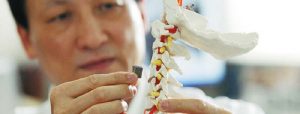Japanese automaker Nissan and NASA are teaming up to advance the technology behind cars that drive autonomously.
Yokohama-based Nissan Motor Co. and NASA’s Ames Research Center at Moffett Field, California, announced Thursday a five-year research-and-development partnership for autonomous vehicle systems so they can eventually be applied to commercially sold cars.
Nissan is excited about the potential of self-driving cars, which executives say could lead to improved safety, a pillar for future autos along with low emission technology.
NASA researchers will be working with Nissan’s research unit in Silicon Valley, they said in a joint statement. Researchers from the two organizations will test a fleet of zero-emission autonomous vehicles that can be used to transport materials, goods, payloads — and people. NASA says the tests will mirror the way the engineers operate rovers in space from a mission control center on Earth.
They said that the first vehicle of the fleet is expected begin testing at the facility by the end of 2015.
The maker of the Leaf electric car and Infiniti luxury models aims to introduce autonomous driving technology to consumers between 2016 and 2020. Ames developed the Mars rover software and robots onboard the International Space Station.
“The partnership brings together the best and brightest of NASA and Nissan and validates our investments in Silicon Valley,” said Nissan Chief Executive Carlos Ghosn.
This is not the first time Nissan has looked to NASA for help and guidance. In 2005, the company used NASA’s knowledge of what it calls the neutral body posture, which is the position the human body naturally assumes in microgravity, to develop a more comfortable driver’s seat for long drives. Nissan debuted the “zero gravity” seats in the 2013 Altima.
The safety technology currently in the works includes cars that know through sensors they are about to collide and will brake automatically, even if the driver doesn’t do a thing. There are also cars that can park themselves.
At its most sophisticated, the technology could replace human drivers altogether, though there are many hurdles to that being put into practice on roads.
Automakers besides Nissan are working on the technology, including Japanese rival Toyota Motor Corp. and U.S. manufacturers General Motors Co. and Ford Motor Co.
Read more: NASA, Nissan to make autonomous car by end of year







